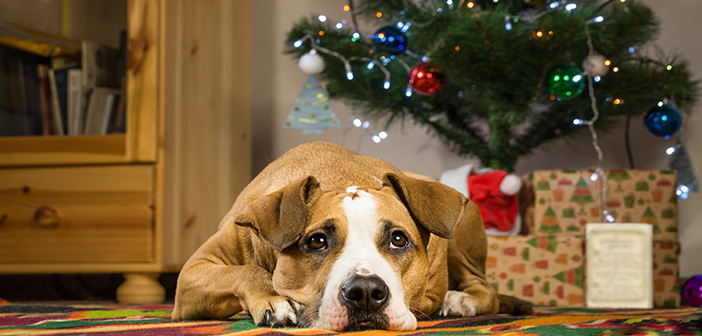While Christmas is a time of fun and festivities, presents, treats and decorations can often prove dangerous for pets if owners are not careful.
The British Veterinary Association is urging pet owners to keep common hazards like chocolates, mince pies, Christmas puddings and festive decorations safely out of reach of their pets to avoid an emergency trip to the vets over the holidays.
The warning comes in a year when there are many owners celebrating their first Christmas with dogs or cats who joined the family during the pandemic and may not be fully aware of the dangers posed by certain festive foods and decoration items.
Chocolate, raisins and other dried fruit, xylitol in sugar-free products, onion, garlic and seasonal decorations like mistletoe and holly can all be dangerous to dogs and cats if eaten. Chocolate is commonly the top doggy edible hazard that requires a visit to the vets over the festive period, while cats are most likely to need veterinary treatment for ingesting non-edible items such as seasonal plants and antifreeze.
A BVA survey last year showed that more than eight in 10 companion animal vets (82%) across the UK had seen at least one case of toxic ingestion over the Christmas break in 2019. The survey found that 94% of vets had seen at least one case of chocolate poisoning in dogs that year, followed by cases involving raisins or sultanas and xylitol.
Seasonal plants like lilies, mistletoe, poinsettias and holly were the top culprits for cats, followed closely by cases of antifreeze poisoning. Vets treating companion animals also saw cases of foreign body ingestion, of which a quarter involved Christmas decorations and a fifth were from gifts that were kept out for humans (e.g small parts of toys).
BVA president Justine Shotton said: “I’ve worked a lot in emergency practice and have seen many avoidable cases involving toxic festive hazards over the years, especially those involving dogs having chocolates and puddings or pies containing raisins. I once had an owner bring in a Labrador to be sick after it had eaten some mince pies, go home after treatment, only to be back at the practice immediately because their other dog had eaten the rest of the box in the meantime!
“It really doesn’t take very long for our inquisitive pets to sniff out chocolates left out under the tree or in advent calendars, gobble down a mince pie when your head is turned, or polish off puddings left unattended on the kitchen counter.
“This can have serious consequences for our pets’ health and can result in costly emergency care, including surgery if they’ve ingested objects like Christmas tree baubles or tinsel. My advice to owners is to keep all edible goodies and decoration items safely out of reach of inquisitive noses and to keep pets to their normal diets, avoiding feeding them any human food treats. If you are concerned that they have eaten something they shouldn’t, consult your vet straight away as this will dramatically improve prognosis.”


